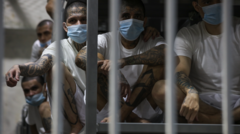In a bold social media appeal, El Salvador's leader seeks to engage Venezuelan authorities in a humanitarian exchange that reflects ongoing tensions surrounding deportation and political freedom.
**El Salvador Proposes Prisoner Exchange with Venezuela Amid Controversy**

**El Salvador Proposes Prisoner Exchange with Venezuela Amid Controversy**
El Salvador's President Nayib Bukele suggests a deal for the repatriation of Venezuelan deportees in exchange for political prisoners held by the Maduro regime.
El Salvador's President Nayib Bukele has put forward a controversial proposal for a prisoner exchange with Venezuela that could see the repatriation of 252 Venezuelans deported by the United States. In exchange, Bukele has urged Venezuelan President Nicolás Maduro to release the same number of political prisoners he claims are unjustly detained for opposing Maduro's regime.
In his social media post addressing Maduro, Bukele highlighted the gravity of the situation, stating that many of the deported Venezuelans had committed serious crimes, including rape and murder, while those imprisoned in Venezuela are political dissidents. Bukele’s approach raises significant human rights questions as he suggests a deal that has been deemed humanitarian. However, it faces skepticism given the Venezuelan government's denial of the existence of political prisoners, which is vehemently contested by human rights organizations.
The situation gained traction recently as over 200 Venezuelans were exported from the US to El Salvador, with the Trump administration branding them members of the Tren de Aragua criminal gang. These deportations have been integrated into El Salvador's notorious high-security prison system, funded by Washington, complicating the country’s immigration landscape further.
Despite Bukele's dramatic proposal, the Venezuelan government has yet to respond publicly, remaining silent amid an international focus on the country’s human rights record and the legitimacy of its political processes. As tensions heighten, the exchange involves not just Venezuelan detainees but also includes around 50 prisoners of different nationalities, potentially including American citizens.
This proposed swap comes at a time when the U.S. Supreme Court recently mandated that the Trump administration halt further deportations of alleged Venezuelan gang members due to ongoing legal challenges. The landscape of political and immigration policy continues to evolve, with both countries entrenched in their respective stances as the world watches how diplomatic efforts may unfold.
In his social media post addressing Maduro, Bukele highlighted the gravity of the situation, stating that many of the deported Venezuelans had committed serious crimes, including rape and murder, while those imprisoned in Venezuela are political dissidents. Bukele’s approach raises significant human rights questions as he suggests a deal that has been deemed humanitarian. However, it faces skepticism given the Venezuelan government's denial of the existence of political prisoners, which is vehemently contested by human rights organizations.
The situation gained traction recently as over 200 Venezuelans were exported from the US to El Salvador, with the Trump administration branding them members of the Tren de Aragua criminal gang. These deportations have been integrated into El Salvador's notorious high-security prison system, funded by Washington, complicating the country’s immigration landscape further.
Despite Bukele's dramatic proposal, the Venezuelan government has yet to respond publicly, remaining silent amid an international focus on the country’s human rights record and the legitimacy of its political processes. As tensions heighten, the exchange involves not just Venezuelan detainees but also includes around 50 prisoners of different nationalities, potentially including American citizens.
This proposed swap comes at a time when the U.S. Supreme Court recently mandated that the Trump administration halt further deportations of alleged Venezuelan gang members due to ongoing legal challenges. The landscape of political and immigration policy continues to evolve, with both countries entrenched in their respective stances as the world watches how diplomatic efforts may unfold.



















